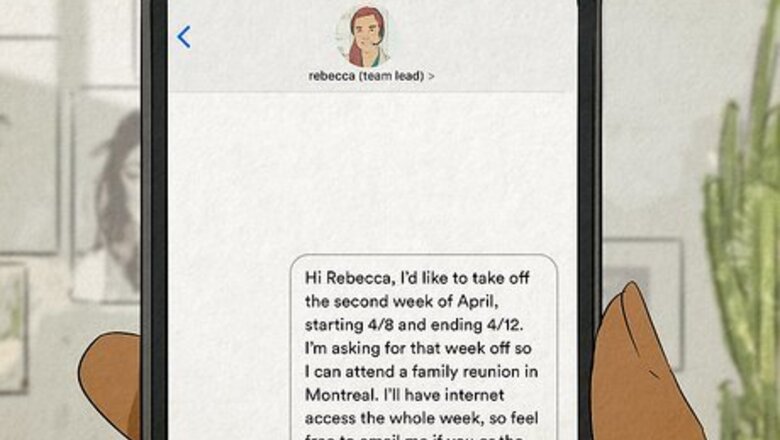
views
Draft your text before sending it.
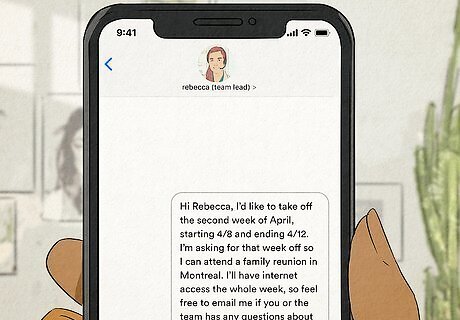
Make sure your request is clear and without typos. When you’re sending a text to your supervisor about requesting time off, it shouldn’t sound casual and hastily-written. The more seriously you take the text, the more your supervisor will realize you care about respecting them and their business. For a standard example of a professional format: First, say hello and clearly provide your request. For example, “Hi there, Sabrina. I’d like to take Monday, January 31 off.” If you can’t come in last-minute, be firm but apologetic. For example, “I’m so sorry, but I won’t be able to come in today.” Clarify if you’ll be using paid time off. For example, “I’d like to use 8 hours of my PTO,” or “I’m planning for this time off to be unpaid.” Finally, thank your supervisor. For example, “Thank you so much!” Or, if your request is sudden, “Thank you for understanding.”
Tell your supervisor you'd like to take time off with confidence.
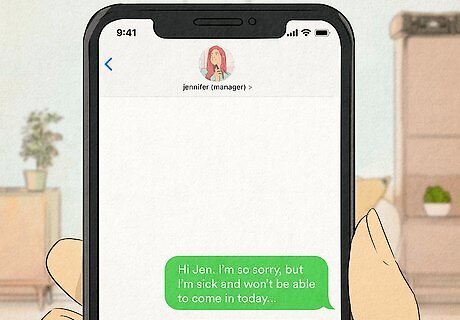
Be forthright about your right to put in a request. When you’re requesting time off, it’s usually better to “tell” your supervisor you’d like it than to “ask” for permission. The less firm you sound in your request being allowed, the more likely your supervisor is to push back on it. As long as you’re following company guidelines, your supervisor shouldn’t be able to deny your request. For example, "Hi Susan. I’m so sorry, but I’m sick and won’t be able to come in today." Or, "Hi Marcus. I’d like to use some PTO to take March 3 off." Know that your supervisor might push back is if other people have requested the same dates or you’ve taken too much time off recently.
Make your text concise.

Don’t go into too much detail about why you’re taking time off. Contrary to popular belief, the more you explain why you need time off, the more likely your supervisor is to question it. Plus, you have a right to a certain degree of privacy. Keep your request as simple as possible. For example, if you’re requesting planned time off to go to a concert in another city, just say “I’ll be out of town on this date.” If you’re requesting sudden time off because of illness, you don’t need to give specific details. Just say “I woke up feeling sick,” or “I have a cold.” That being said, if you have symptoms that may put you out of work for several days, tell your supervisor you might need more than one day.
Be honest about needing the day off for an emergency.

You have a right to deal with actual crises. If you need time off because something happened to you or a loved one, you should be upfront about needing to deal with it. Similarly, if you need to attend to a mental, physical, or emotional health crisis, be honest about it instead of fabricating an excuse. Most supervisors should understand if you stress how much you need this time off. For example, "I won't be coming in today. Something happened with a family member." Or, "I'm having a bad mental health day and need to stay home." Though you can ask for time off if you're really unable to work, you shouldn't exploit these opportunities, especially if you aren't using PTO or sick time.
Avoid making excuses if you don’t have a valid reason.

Tell your supervisor you need time off for “personal reasons.” If you need a day off but don’t have a valid reason for why, don’t pretend you’re sick or in an emergency. Fabricating a story puts you at risk of being caught lying. Instead, give your supervisor a succinct message that just says you won’t be coming in. For example, if you want the day off to go to the beach, don’t tell your supervisor “I have the flu.” This will cause them unnecessary panic. Instead, politely and concisely say, “I need to take the day off for personal reasons. I’m so sorry. I’ll be in tomorrow.” Use the “personal reasons” explanation if you want a mental health day but don’t feel like your supervisor will respect your needs.
Suggest making up for unpaid time off.
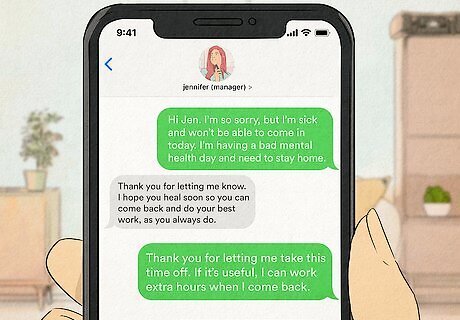
Prove you know the importance of your work. Depending on your field of work, you may be able to negotiate with your supervisor to work extra hours when you’re back. Even if your supervisor declines your offer, it shows that you’re not taking the opportunity for time off for granted. Depending on your field, you may be able to work extra shifts to cover other people, or work overtime or outside regular hours. For example, “Thank you for letting me take this time off. If it’s useful, I can work extra hours when I come back.” Alternatively, you can ask if there are tasks you can do while you’re out. For example, “Is there anything I can do while I’m out of the office?”
Offer to be available if you're on the clock at home.

Let your supervisor know they can reach you by text or e-mail. If you’re calling out sick and still getting paid, you might be obligated to work a little from home. Tell your supervisor that they can contact you in case of an emergency or question. This is a considerate offer after unexpectedly inconveniencing them, and proves you aren’t trying to take advantage of them. For example, “I’ll be staying home today, but please don’t hesitate to reach out via text or e-mail.” You only need to offer this if you're still on the clock. If you're taking unpaid time off or using PTO, you aren't obligated to keep working. That being said, it can be a tactical gesture if you're concerned about taking too much time off and want to save face.
Request multiple days if you’re unsure how long you need.
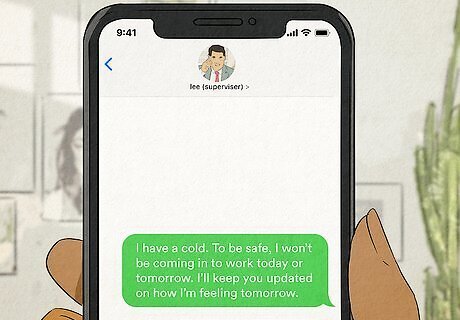
Give an estimate of how long you’ll be out for illness or emergency. If you’re calling out of work because you’re sick, you’re probably going to be unable to go in to work for a few days. In this case, let your supervisor know that you’re unsure how long you’ll need, but give a rough estimate and let them know that you’ll keep them updated. As a rule of thumb, if you’re sick today, you’ll probably need tomorrow off as well. For example, “I have a cold. To be safe, I won’t be coming in to work today or tomorrow. I’ll keep you updated on how I’m feeling tomorrow.”
Send texts during regular business hours.

Avoid bothering your supervisor at night or during the weekend. When you’re asking for time off, it’s best to treat it like a business-related request. In other words, don’t bring it up off the clock, when your supervisor might be trying to enjoy their own time off. Stay on your supervisor’s good side by sending a text during work hours. This is a little different if you wake up and decide you need the day off. In this case, shoot a text as early as you can. But if you can wait on getting it approved, like you’re requesting time off for the future, send it during regular business hours.
Put your request in as early as possible.

Notify your supervisor weeks or months in advance if possible. If you’re making plans that require you to take time off, let your supervisor know the dates as soon as you finalize them. They’ll be more likely to approve them if they’re given time to plan around your absence. This is especially significant if you’re new at your job or you're requesting a time of year that others might want off, like a holiday. If you’re suddenly asking for the day off because you’re sick, you should tell your supervisor as soon as you wake up and decide to stay home. Check if your workplace has a formal time off procedure. There might be a specific method and amount of time your supervisor requires.
Prepare for your request to be denied.

Have a backup plan or be ready to negotiate a compromise. There’s a possibility that your supervisor won’t accept your request for time off. If it’s because you’re requesting time off during a busy period or someone else has already requested the same time, you might be able to negotiate. If you’re requesting too much time off, you might have to find a compromise. If your plans aren’t fixed, like you don’t already have a plane ticket, you can politely ask for a different date. If your supervisor says you’re requesting too much time off, you might have to settle for less. If you work in a field where someone could fill in for you, ask around for one of your coworkers to switch shifts with you.



















Comments
0 comment